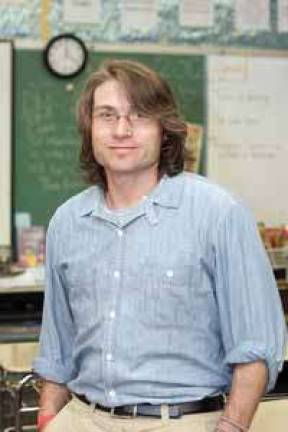Blackboard Awards: Andrew Adler, Using Computers to Teach the Three Rs

By David Gibbons Buzzwords and catchphrases such as "digital literacy" don't mean much without dedicated, hard-working teachers like Andrew Adler to put them into practice. Adler, 40, teaches eighth-grade humanities at the Lab Middle School for Collaborative Studies, known for its pioneering role in ICT (Integrated Co-Teaching), wherein classes are co-taught by a general education specialist and a special education specialist (Adler's role). About 40 percent of the students in Adler's classes have learning disabilities. Lab is outstanding, if not unique, in its insistence on both rigor and inclusion and in its ability to maintain high academic standards while integrating special needs students into nearly every class. Adler's approach is often cited for going beyond the call of duty; for example, he spends many after-school hours mentoring his students. But perhaps what makes him most representative of the school's core values is his commitment to innovation. Lab's principal, Megan Adams, who hired him just over four years ago, said "Andy is constantly working to stay current on the research and strategies?which has a tremendous impact on both the classroom and the school." After an inauspicious start to his teaching career-he was assigned to a special ed classroom at a high school in California and simply instructed to keep the kids quiet and in their seats-Adler earned his master's degree from George Washington University in 2002. Idealistic and determined, he soon became convinced that all students have the capacity to learn, regardless of how severe their disabilities are. He developed a passion for so-called adaptive technologies-the use of up-to-date hardware and software to implement individualized education plans and increase one-on-one instruction time. His main thrust is to engage students who would otherwise be disengaged, to bring them back to school when they might be inclined to walk away in frustration. "For students who struggle with reading," he explained, "we need to help them build up their schema, which is a fancy word for background knowledge, so they can better understand the material being covered. We may show them a movie or use photos to help them access content." Many of Adler's recent efforts have involved using the iBook Author program and iPads, adapting various historical source materials to different reading levels and learning styles. He also recently used Google Docs, which allows two users at their respective computer screens to work on the same file simultaneously, as a tutoring device, prompting a student through the difficult task of writing a paper, and in the process teaching him valuable research and presentation skills. Adler was awarded a scholarship by the Bank Street College of Education to pursue a degree in school-building leadership, which he hopes will give him more ammunition in his ongoing quest to harness technology as a compelling educational tool. Call it digital literacy if you like, but from his perspective, it's nothing more than using modern-day machines to teach the good old three Rs. Adler counts as his biggest professional satisfaction "that moment when a student develops, presents, writes or comprehends something they never believed was possible. As a teacher, you don't hit too many out of the park; you have to move your students around the bases. Every now and then, though, you get that perfect pitch, and you're surprised."